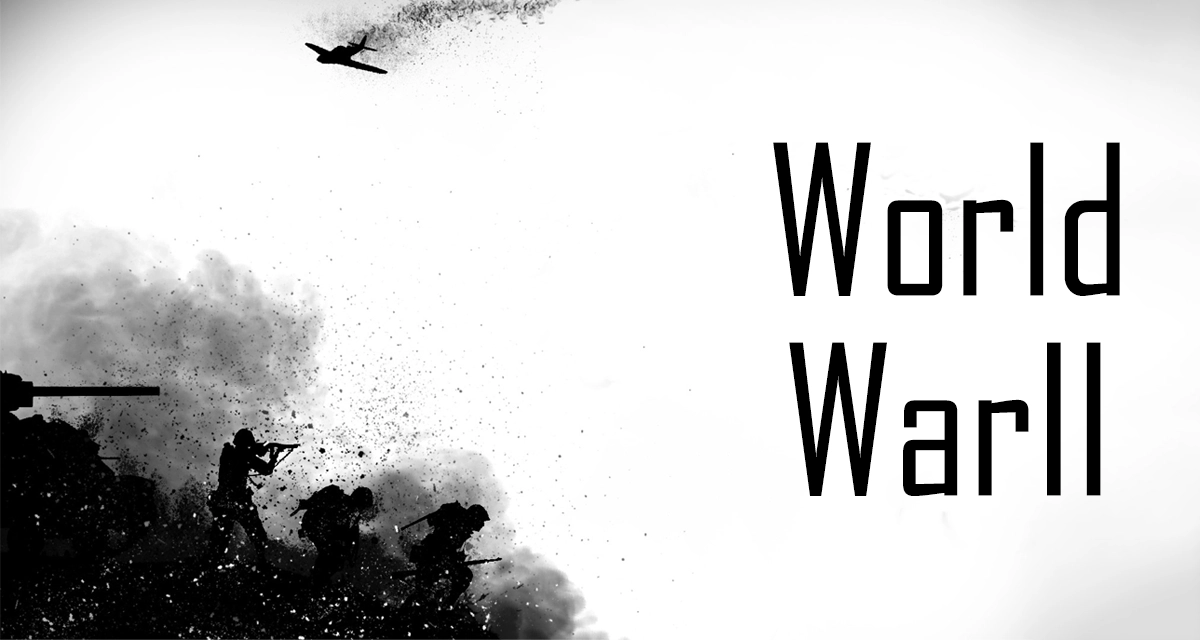World War 2
World War II (1945-1939) was one of the biggest and bloodiest wars in history that took place on a global scale. In this war, many warring powers including Nazi Germany, Soviet Union, United States, England and Japan were involved. World War II occurred as a result of political, economic and geographical factors, as well as ideological beliefs and tensions caused by World War I
Causes of the start of World War II
National prejudices and military force development
After the First World War, many countries sought to strengthen their military power and develop military equipment. Nazi Germany under the leadership of Adolf Hitler and Italy under the leadership of Benito Mussolini sought to develop their power and fulfill their imperial goals.
The rise of fascist regimes in Germany and Italy, fascist regimes came to power. These regimes were founded on the principles of racism, colonialism and imperial development. Nazi Germany announced its geographical expansion plans by sabotaging and threatening globalization
Adolf Hitler and his motives for starting World War II
Adolf Hitler (1889-1945) was the Nazi leader and dictator of Germany during World War II.
With the supremacy of the Aryan class and the promotion of the pure race, he had colonial ideals and the occupation of new territories in front of him. These goals of Hitler, along with other factors, encouraged him to start World War II
Hitler’s racism, the biggest cause of the start of World War II
Hitler joined the belief of racism and Aryanism and believed that the Aryan race is the best human race. He sought the development of German territories and tried to conquer and promote the Aryan race in Europe
Hitler as an imperialist
Hitler wished to realize the enlargement of Germany and return to the power and position he had in the past. He moved to colonize and conquer new territories to secure natural resources and new markets.
Nazi leader Adolf Hitler and other Nazis believed that the Treaty of Versailles (a treaty after World War I) was detrimental to Germany and had humiliated and weakened Germany. Therefore, their main goal was to change Germany’s international status and cancel the Treaty of Versailles.
Hitler had a dream of creating German imperialism from Luffen-Rahme, which included the expansion of the German living space and the integration of the peripheral regions into Germany
Did World War II cause changes in the role of women in society?
Yes, World War II had major effects on the role of women. With the presence of more men on the war front, women began to work in industrial societies and their educational and social roles expanded
How did the Holocaust happen?
The Holocaust was one of the darkest pages in the history of mankind. The Nazi regime, led by Adolf Hitler, carried out plans to kill millions of Jews and other ethnic groups in Europe
What role did it play in the victory of the allied forces in World War II?
The victory of the allied forces in World War II was the result of the cooperation and solidarity of different countries. The combination of American, Soviet, British and other countries’ forces led to successes such as the Battle of Stalingrad and D-Day
D-Day, in American military terms, usually refers to the day when a major offensive operation in the war is to begin
Germany’s aggressive policies
Adolf Hitler, the leader of Nazi Germany, intended to achieve hegemony and conquer the European continent by attacking the most strategic regions of Europe such as Poland, Czechoslovakia and Poland.
Japan’s policies in Asia: Japan sought to form an Asian empire by occupying areas such as Manchuria, Korea and China. Japan’s war against China in 1937 led to the gradual occupation of large Chinese territories by Japan.
start of war
World War II started with Nazi Germany’s invasion of Poland on September 1, 1939. After that, France, England and other countries in Europe and Asia got involved. At the same time, Japan also attacked China in September 1939 and part of the allied forces were directed to Asia.
Notable events during the war
German attack on France Avoiding the eyelash line, Germany quickly attacked and conquered France in 1940. This quick and successful German attack was the most tragic event of the early war.
Japanese attack on the US naval base at Pearl Harbor
On December 7, 1941, Japan unexpectedly attacked the US naval base at Pearl Harbor, bringing the US into the war.
Battle of Stalingrad
The Battle of Stalingrad was one of the largest and most important battles of World War II between the Soviet Union and Nazi Germany. This battle was fought from July 17, 1942 to February 2, 1943 in the city of Stalingrad (now Saint Petersburg) in Russia. The Battle of Stalingrad played an important role in the destruction of the Soviet Union and changed the fate of World War II.
When the German forces under the command of General Friedrich Paulus approached Stalingrad, they surrounded the city and attacked it heavily. From September 1942 to January 1943, German forces were able to reach and capture parts of the city. But the Soviet forces put up strong and tough resistance against the German attacks.
During the cold winter of 1942, conditions became very difficult for the German forces. Their supply lines were cut off by Soviet forces and they faced shortages of food, fuel and equipment. In addition, the Soviet forces launched a victorious operation called “Operation Tear” in January 1943, attacking the areas occupied by the Germans and were able to reach the city of Stalingrad.
In the 345 days of the Battle of Stalingrad, the Soviet forces were able to recapture the city from the Germans and break the siege. This huge victory for the Soviets changed the fate of World War II and showed that Nazi Germany was not capable of quick and final victories. After the Battle of Stalingrad, Soviet forces moved westward and gradually advanced decisively against Germany until the end of the war.
The Battle of Stalingrad was one of the historical turning points in World War II and is remembered as one of the largest heavy battles in history. Also, this battle killed and wounded millions of Soviet and German soldiers and civilians and had a major impact on the downfall of Nazi Germany in World War II.
Reasons for World War II:
Consequences of the First World War
The First World War caused tensions, economic crises, destroyed military forces and unemployed and dissatisfied people. Some believe that the conditions after the First World War and the prominence of war crimes and unprecedented hardships for some countries indirectly contributed to the outbreak of the Second World War.
Fascist and Nazi regimes came to power in Germany
With the rise of fascist and Nazi regimes in Nazi Germany and Italy, fascist and Nazi regimes came to power. Adolf Hitler in Germany and Benito Mussolini in Italy tended to war with their strategies of conquest and expansion of their empires and created serious threats to the strength of the world.
Lack of understanding between world powers
At the beginning of World War II, world powers such as England, France, Germany, Italy and the Soviet Union faced each other. Interviews between different forces and political and military movements in the world led to the escalation of tensions and finally led to the formation of World War II.
Development of military forces and weapons
During the 1930s, many countries developed their military forces and improved military equipment. Soldiers and commanders in Germany, Italy, Soviet Union and Japan sought to expand the military force, which strengthened their military and strategic power and responded to the formation of offensive powers.
Climatic and ethnic tensions
Climatic and ethnic tensions and contradictions also contributed to the outbreak of World War II. Among others, we can mention the ethnic crises in Europe, such as the racist claims of Nazi Germany and ethnic conflicts in areas such as the Balkans and Eastern Europe.
Overall, World War II occurred due to a combination of historical, ideological, economic, and political factors. These factors intensified the tensions and insistence on conquest and development by the great powers and led to a great and devastating war that involved the whole world.
In the Second World War, the disintegration and collapse of some countries was a reality that arose as a result of the consequences of the war and political changes. Some of the countries that had the biggest impact on segregation are:
Soviet Union
During World War II, the Socialist Soviet Union came out of the war as one of the victorious forces. After the war, territories captured by the Soviet Union, including former members of the Soviet Union, became newly independent states.
Yugoslavia
In World War II, Yugoslavia was one of the allied countries on the Allied front. After the war, some regions of Yugoslavia were divided into new countries such as Serbia, Croatia, Bosnia and Herzegovina, Montenegro and Macedonia.
Germany
After the defeat of Nazi Germany in World War II, Germany was occupied by the Allies. As a result of the division of Germany, East Germany (German Democratic Republic) and West Germany (Federal Republic of Germany) were formed.
Czechoslovakia
After World War II, Czechoslovakia was disintegrated and defeated. The Czechoslovak Republic was divided into the Czech Republic and Slovakia
they are rich
After World War II, Poland was partitioned as a result of agreements between the Great Powers. New borders between Poland and the Soviet Union were formalized and a part of Poland’s land was handed over to the Soviet Union
The division and separation of countries in the Second World War is mostly related to political, military factors and big government powers and is generally the result of the consequences of the war and political changes in the post-war period
The end of World War II in Europe
On May 7, 1945, Nazi Germany was completely defeated and Third Germany collapsed at the hands of the Allied Forces (Soviet Union, United States of America, Great Britain and other allied countries). Nazi leader Adolf Hitler committed suicide, and Germany declared an armistice and officially surrendered shortly thereafter on May 8, 1945. This event became known as “Victory in Europe Day”
The end of World War II in Asia and the Pacific region
After the armistice in Europe, the war continued in Asia and the Pacific. In April 1945, the Allied forces under American command led by General Douglas MacArthur used Japan in the Hiroshima and Nagasaki nuclear attacks. These nuclear attacks, along with the advance of the Allied forces and the economic and military pressure on Japan, led to Japan’s unconditional surrender on August 15, 1945. This event is known as “Victory of Japan Day” or “Barber Day” and ended World War II with Japan’s surrender
Finally, the end of the Second World War was officially announced in 1945 with the victory of the Allied forces and the defeat of the Axis Powers (Nazi Germany and Japan) in two different phases





